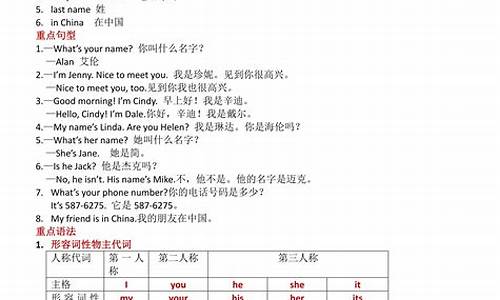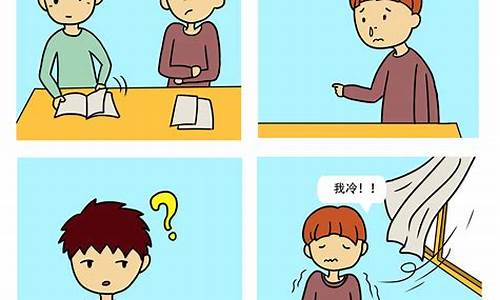您现在的位置是: 首页 > 搞笑语录 搞笑语录
人教版初中英语重点句子朗读维克多_人教版初中英语重点句子
tamoadmin 2024-09-09 人已围观
简介1.初三英语重点知识点的归纳2.人教版初一上册英语知识点整理3.九年级英语知识点归纳总结大全希望多少对你有点帮助 一、动词+介词1.look at…看…, look like … 看上去像……, look after …照料…2.listen to…听……3.welcome to…欢迎到……4.say hello to …向……问好5.speak to…对……说话此类短语相当于及物动词,其后必须带
1.初三英语重点知识点的归纳
2.人教版初一上册英语知识点整理
3.九年级英语知识点归纳总结大全

希望多少对你有点帮助
一、动词+介词
1.look at…看…, look like … 看上去像……, look after …照料…
2.listen to…听……
3.welcome to…欢迎到……
4.say hello to …向……问好
5.speak to…对……说话
此类短语相当于及物动词,其后必须带宾语,但宾语无论是名词还是代词,都要放在介词之后。
二、动词+副词
“动词+副词”所构成的短语义分为两类:
A.动词(vt.)+副词
1.put on 穿上 2.take off脱下 3.write down记下
此类短语可以带宾语,宾语若是名词,放在副词前后皆可;宾语若是人称代词,只能放在副词的前面。
B.动词(vi)+副词。
1.come on赶快 2.get up起床 3.go home回家
4.come in进来 5.sit down坐下 6.stand up起立
此类短语属于不及物动词,不可以带宾语。
三、其它类动词词组
1.close the door 2.1ook the same 3.go to work/class
4.be ill 5.he a look/seat 6.he supper
7.1ook young 8.go shopping 9.watch TV/games
10. play games
[介词短语聚焦]
“介词+名词/代词”所构成的短语称为介词短语。现将Unitsl-16常用的介词短语按用法进行归类。
1.in+语言/颜色/衣帽等,表示使用某种语言或穿着……。
2.in + Row/ Team/ Class/ Grade等,表示“在……排/队/班级/年级”等。
3.in the morning/ afternoon/ evening/ 表示“在上午/下午/傍晚”等一段时间。
4.in the desk/ pencil-box/bedroom 等表示“在书桌/铅笔盒/卧室里”。
5.in the tree表示“在树上 (非树本身所有)”;on the tree表示“在树上(为树本身所有)”。
6.in the wall表示“在墙上(凹陷进去)”;on the wall表示“在墙上(指墙的表面)”。
7.at work(在工作)/at school(上学)/at home(在家)应注意此类短语中无the。
8.at + 时刻表示钟点。
9.like this/that表示方式,意为“像……这/那样”。
10.of短语表示所属关系。
11.behind/ beside/ near/ under+ 名词等,表示方位、处所。
12.from与to多表示方向,前者意为“从……”,后者意为“到……”。
另外,以下这些短语也必须掌握。如:on duty, after breakfast, at night, at the door, in the middle, in the sky, on one’s bike等。
[重点句型大回放]
1.I think…意为“我认为……”,是对某人或某事的看法或态度的一种句型。其否定式常用I don’t think…,
2.give sth. to sb./ give sb. sth. 意为“把……给……”,动词give之后可接双宾语,可用这两种句型;若指物的宾语是人称代词时,则只能用give it/ them to sb.
3.take sb./ sth. to…意为“把……(送)带到……”,后常接地点,也可接人。
4.One…, the other…/One is…and one is…意为“一个是……;另一个是……”,必须是两者中。
5.Let sb. do sth. 意为“让某人做某事”,人后应用不带to的动词不定式,其否定式为Don’t let sb,do sth.,或Let sb. not do sth. 另外,Let’s 与Let us的含义不完全相同,前者包括听者在内,后者不包括听者在内,
6.help sb. (to) do sth./help sb. with sth.意为“帮助某人做某事”,前者用不定式作宾补,后者用介词短语作宾补,二者可以互换.
7.What about…?/How about…?意为“……怎么样?”是用来询问或征求对方的观点、意见、看法等。about为介词,其后须接名词、代词或V-ing等形式。
8.It’s time to do…/ It’s time for sth. 意为“该做……的时间了”,其中to后须接原形动词,for后可接名词或V-ing形式。
9.like to do sth./like doing sth.意为“喜欢做某事”, 前一种句型侧重具体的一次性的动作;后一种句型侧重习惯性的动作,
10.ask sb.(not) to do sth. 意为“让某人(不要)做某事”,其中ask sb.后应接动词不定式,
11.show sb. sth. / show sth. to do. 意为“把某物给某人看”,该句型的用法同前面第2点。
12.introduce sb. to sb. 意为“把某人介绍给另一人”;introduce to sb.则是“向某人作介绍”
001. a bottle/glass/cup… of 一瓶/茶杯/玻璃杯
002. a few 一些
003. a kind of 一种;一类
004. a little 一点;少量
005. a lot of…(lots of…) 许多的
006. a moment later 片刻之后
007. a number of 若干的;许多的
008. a pair of 一双;一副
009. a piece of 一块(张;片;只)
010. all day(long) 整天;一天到晚
011. all kinds of 各种各样
012. all one’s life 一生;终生
013. all over 到处;结束
014. all over the world 全世界
015. all right 行了;好吧;(病)好了
016. all the same 仍然
017. all the time ①一直;始终②老是(美国英语)
018. arrive at/in 到达某地
019. as…as… 一样
020. as…as one can(=as…as possible) 尽量
021. as soon as 一就
022. at breakfast 早餐时
023. at first 起先;开始的时候
024. at home 在家
025. at last 最后;终于
026. at night 在夜里
027. at noon 在正午
028. at once 立刻;马上
029. at school 在学校上课
030. at the back of 在……的后面
031. at the head of 在……的前面
032. at the moment 此刻
033. at the same time 同时
034. at this time of (the) year 在(一年中)这个时节里
035. at times 时常;有时
036. at work 在工作
037. be able to do sth. (= can+V.) 能够
038. be angry with sb. 生某人的起 be angry at/about sth. 生某事的气
039. be born 出生
040. be different from… 和……不同
041. be full of 充满着……
042. be good at 善于 be bad at拙于
043. be good for 对……有益的 be bad for 对……有害的
044. be in hospital 生病;住院 be in the hospital 在医院
045. be late for 迟到
046. be like 像
047. be made of (be made from) ……制的;用…….制成的
048. be/get ready 准备好
049. be sure 肯定;确定
050. break down ①(机械)损坏②拆散(某物)
051. by+交通工具 搭乘某交通工具
052. by the way 顺便一提
053. by then 到那时
054. catch (a) cold; he a cold 感冒
055. change one’s mind 改变想法(注意)
056. come back 回来
057. come down 下来
058. come from ①出生于②来自于
059. come in 进入;进来come out 出来
060. come over 过来;顺便来访
061. come around (走)过来(绕行而来)
062. day after day 日复一日地;天天
063. do(es) +V.ing 做某事
064. do sport 运动;参加(体育)运动
065. does well ①做得很好②成功③成绩很好
066. each other 互相
067. eat up 吃完
068. either…or… 不是……就是
069. enjoy oneself 过得愉快
070. fall behind 落后;跟不上
071. fall off ①跌落;掉下②(质或量)下降
072. far away 遥远
073. feel like doing sth. 想要做某事
074. feel tired 感到疲劳
075. find out 查明;发现;了解
076. from now on 从今以后;今后
077. from … to … 从……到……
078. get back ①返回②取回
079. get down ①下来;落下②记下来
080. get dressed 穿衣服
081. get home 大家
082. get into ①进入②搭乘(出租车)③陷入(坏的情况)
083. get off ①下车②起飞
084. get on ①上车②生活
085. get on (with…)= get along (with…) ①生活②与(某人)相处③(活动)有进展
086. get out of ①从......出来②从出租车(轿车)下来
087. get ready to do sth. 准备做某事
088. get up ①起床②起立
089. get warm (long) 变暖和(长)
090. give a call 给……打电话
091. give back 归还;送回
092. go back 回去
093. go for a walk 散步
094. go home 回家
095. go on 继续
096. go shopping 去购物
0. go to bed 睡觉(并未入睡)
098. go to school 上学
099. go to sleep 入睡;睡着
100. go to the cinema 看**
101. grow up 成年;长大成人
102. half an hour 半小时
103. he a drink of 喝一点……
104. he good time 玩得很高兴;过得愉快
105. he a look (at) 看一看
106. he a match 比赛he a test 测验
107. he a meeting 开会
108. he a rest 休息
109. he a swim 游泳
110. he a talk 谈话
111. he a walk 散步
112. he a wash 洗(手,脸等)
113. he breakfast 吃早饭
114. he lessons/classes 上课
115. he lunch 吃午饭
116. he sport 进行体育活动
117. he supper 吃晚饭
118. he to 不得不;必须
119. hear from+sb. 收到某人的来信
120. hear of 听说
121. help sb. with sth 在某事上帮某人help sb. (to) do sth. 帮助某人做某事
122. hold a meeting (= he a meeting) 举行会议
123. hold on ①等一等(别挂电话)②坚持;持续
124. hour after hour 一小时又一小时地;持续地
125. how long ①(时间)多长;多长②(长度)多长
126. how many/much 多少/多少(钱)
127. how often 多久;多常
128. how old 几岁;多大(年纪)
129. hundreds of 数百
130. hurry of 匆匆离去;赶快去
131. hurry up 赶快
132. in a minute 一会儿;立刻
133. in bed 躺在床上
134. in English 用英语(说)
135. in front 在前方(面);在正对面
136. in front of 在......前面
137. in time 正好;及时
138. in the middle of 在……中间
139. jump into 跳进……
140. just a moment 等一会儿
141. just then 正在那时
142. keep busy (一直)忙碌
143. last year 去年
144. later on 过后;以后
145. laugh at 嘲笑
146. listen to 听……(讲话)
147. look after 照料;照顾
148. look at (注视着)看;观看
149. look for 寻找
150. look into 往……里看
151. look like 看起来像
152. look over (医生)检查
153. look the same 看起来很像
154. lots of 许多;很多;大量
155. make friends with 与……交朋友
156. make sure 务必
157. middle school 中学
158. move away 搬开;搬走
159. move to 搬到
160. neither… nor… 既不……也不
161. never mind 不要紧;没关系
162. next time 下次
163. no longer (=not…any longer) 不再
164. not … at all 一点也不;根本不(用来加强not的语气)
165. not at all 不用谢;别客气
166. not so … as 不像;不如
167. on foot 走路;步行
168. on show 展览;被陈列着
169. on the earth 在地球上
170. on the (one’s) way 在途中;在路上
171. on time 按时;准时
172. out of 在……之外;从……里头
173. over there 在那边;在对面
174. Party member ***员
175. pass on 传递
176. pay for付钱;支付;付出代价
177. play with 玩耍
178. post office 邮局
179. pull out of 把……从……拉出来
180. pull …up from 把……从……拉上来
181. put on 穿;戴上;上演
182. right away 立刻;马上
183. right now 现在;刚刚
184. send away 撵走;开除;解雇
185. send up 发射
186. sit down 坐下
187. so …that 如此……以致……
188. speak to sb. 与……佳话
189. spend some time on 在……花时间
190. stop sb. from doing sth. 阻止某人做某事
191. take a rest 休息
192. take a walk 散步
193. take away 拿走
194. take down 取下
195. take exercise 锻炼(身体)
196. take off 脱掉衣物
1. take one’s time ①不急;慢慢干②用去(某人)时间
198. take part in 参加
199. take/he some medicine 服药
200. take the train/a boat/a bus…坐火车/船/公共汽车……
201. talk about 谈论
202. talk to 与……谈话
203. teach oneself 自学
204. tell (sb.) about 告诉(某人)……
205. the other(s) 另一个(其他的)
206. think about 考虑(是否去做)
207. too …to 太……不能……
208. try on 试穿;试试看
209. turn green 变绿
210. turn off 关掉(自来水,电灯,收音机等)
211. turn on 开;旋开(电灯,无线电等)
212. up and down 上上下下;来回地
213. very much 很;非常
214. wait for 等候;等待
215. wear out 穿坏;穿旧;用尽
216. with one’s help 在(某人)帮助下
217. work on ①从事……工作②继续工作③研究
218. worry about 担心;着急
219. write down 写下;记下
初三英语重点知识点的归纳
打盹会做梦,学习会圆梦。学习外语并不难,学习外语就像交朋友一样,朋友是越交越熟的,天天见面,朋友之间就亲密无间了。下面是我给大家整理的一些 八年级 英语的知识点,希望对大家有所帮助。
英语八年级上册知识点 总结
句子 成分和类型
1.主语:句子所陈述的对象。
2.谓语:主语发出的动作。一般是有动作意义的动词。
3.宾语:分为动词宾语和介词宾语,属于动作的承受者。
4.系动词:表示状态或状态变化的动词,没有实际的动作意义。如 be, 感官系动词(look, sound, smell, taste 和 feel)、保持类系动词(keep, stay 和 remain)、状态变化类系动词(become、get、turn 和 go)等。
5.表语:紧跟系动词后面的成分。
6.定语:修饰名词或代词的成分。
7.状语: 修饰形容词、副词、动词或句子的成分。
8.补语:分为宾语补足语和主语补足语。是对宾语和主语的补充说明,与其有主动或被动的逻辑关系。
例如:You should keep the room clean and tidy.
你应该让屋子保持干净整洁。
(You是主语, should keep是谓语,the room是宾语,clean and tidy是宾语补足语。)
This kind of food tastes delicious.
这种食物吃起来很可口。
(This kind of food是主语, tastes是系动词, delicious是表语。)
注意:主语、谓语、宾语、系动词、表语、补语是一个句子的主干成分;定语和状语是一个句子的修饰性成分,不是主干成分。
9.简单句的基本形式是由一个主语加一个谓语构成。
10.复合句由一个主句和一个或一个以上的从句构成。
11.两个或两个以上的简单句用并列连词连在一起构成的句子,叫做并列句,其基本结构是“简单句+并列连词+简单句”。
一般疑问句
一、不用疑问词,但需要用yes或no回答的疑问句,叫一般疑问句。句末用问号“?”。
一般疑问句的基本用法及结构一般疑问句用于对某一情况提出疑问,通常可用yes和no来回答,读时用升调。其基本结构是“be / he / 助动词+主语+谓语(表语)”:
Is he interested in going? 他有兴趣去吗?
He you ever been to Japan? 你到过日本吗?
Does she often he colds? 她常常感冒吗?
Did you ask her which to buy? 你问没问她该买哪一个?
二、陈述句变一般疑问句的 方法
1.动词be的疑问式:动词be根据不同的时态和人称可以有am, is, are, was, were等不同形式,可用作连系动词(表示“是”、“在”等)和助动词(用于构成进行时态和被动语态等),但不管何种情况,构成疑问式时,一律将动词be的适当形式置于句首:句型:Be动词+主语~?
Is your father angry?你父亲生气了吗?
Yes,he is.是的,他生气了。
No,he isn't.不,他没生气。
Were the babies crying last night?(进行时)
昨天晚上这些孩子们一直在哭吗?
Yes,they were.是的,他们在哭。
No,they weren't.不,他们没哭。
Is English spoken all over the world?(被动语态)
全世界都说英语吗?
Yes,it is.是的。
No,it isn't.不。
2.动词he的疑问式:动词he根据不同的时态和人称可以有he, has, had等形式,可以用作实意动词和助动词,分以下情况讨论:
①用作实意动词表示状态,如表示拥有、患病或用于he to表示“必须”等,在构成构成式时可以直接将he, has, had置于句首,也可根据情况在句首使用do, does, did:
Does he he [Has he] anything to say? 他有什么话要说吗?
Do you he [He you] to lee so soon? 你必须这么早走吗?
Did you he [Had you] any friends then? 他当时有朋友吗?
②用作实意动词表示动作,如表示“吃(=eat)”、“喝(=drink)”、“拿(=take)”、“收到(=receive)”、“度过(=spend)”等,构成疑问式时不能将he提前至句首,而应在句首使用do, does, did:
Does he he breakfast at home? 他在家吃早餐吗?
Did you he a good time at the party? 你在晚会上玩得高兴吗?
③完成时的一般疑问句
句型:He(Has)+主语+动词的过去分词+~?
He you known her since your childhood?
你从童年就认识她吗?
Yes,I he.是的。
No,I hen't.不。
过去完成时的一般疑问句
句型:Had +主语+动词的过去分词+~?
Had he learned about two thousand English
words before he came here?
他来这里以前就已经学了大约两千个单词了吗?
Yes,he had.是的。
No,he hadn't.不。
八年级上册英语期中知识点总结
1. It takes sb. some time to do sth. 花费某人某些时间去做某事,例如:
It takes me twenty minutes to get to school on foot every morning.每天早晨我步行到学校要花费二十分钟。
It will take three hours to finish the work.完成那项工作需要花费三个小时。
2.depend v. 依靠,依赖depend(常与on, upon连用)视情况而定
It all depends on how you tackle the problem.那要看你如何应付这问题而定。
Children must depend on their parents.孩子们必须依赖他们的父母
3.How do you get to/reach/arrive at school? 你怎样到达学校?
I ride to school./ I get to school by bike.骑车
I take a bus to school. / I get to school by bus.做公共汽车
I take the subway to get to school./I get to school by subway.坐地铁
I walk./ I get to scool on foot 走着去
4 .on/in+修饰词(形容词性物主代词;名词所有格;冠同等)+交通工具,强调乘坐某种交通工具。For example:
Jack goes to school on his bike.杰克骑车去学校
Mr. Green goes to work in his car every day. 格林先生每天开车去上班
5. How does Lucy go to school?(单三)路西怎么去学校?
She rides her bike. 她骑车去
6. How long does it take?那要花多长时间?
It takes twenty minutes. 花20分钟
7 .How long does it take them to get to the bus station?到汽车站得多久?
It takes them about two hours to get to the bus station.用了他们两个小时
8. How far is it from his home to school? 从家到学校有多远?
It is five miles. 五英里
9. We waited at the bus stop. 我们在公共汽车站等(车)。
10.The old man lives on a small pension.老人靠一小笔退休金生活。
11. I've never heard of anyone doing that. 我从未听说有人做那种事。
12. A town is bigger than a village but smaller than a city. town通常指“城镇、集镇、小镇”,对应于country/countryside.有时指城市里的闹市区或商业中心。
13. until用于肯定句中,表示动作一直持续到until所表示的时间为止。
I will wait here until the concert is over.我将一直在这儿等到音乐会结束。
14. not…until用于否定句中,表示动作的转折。意思为“直到……才”
主句的谓语动词是表示瞬间(终止性的)动作的词。
She can't lee until Friday.在星期五之前她不能离开
八年级上册英语知识点归纳2021
Unit 1.How often do you exercise?
I. 重点 短语 归纳:
on weekends 在周末
1. go to the movies 去看**
2. look after=take care of 照顾
3. surf the internet 上网
4. healthy lifestyle 健康的生活方式
5. go skateboarding 去滑滑板
watch TV看电视
6. keep healthy=stay healthy = keep in good health 保持健康
keep + 形容词 表保持某种状态
do some reading 阅读
7. exercise= take/do (much) exercise=do sports锻炼
8. eating habits 饮食习惯
9. take more exercise 做更多的运动
10. the same as 与什么相同
11. once a month一月一次
12. be different from 不同
13. twice a week一周两次.three times a week一周三次
14. make a difference to 对什么有影响
As teachers, you must believe that you can make a difference to the lives of your students.
身为教师,你们必须坚信你们能够影响学生的一生。
A false step will make a great difference to my future.
错走一步对我的前程来说会产生很大影响。
15. how often 多久一次,询问动作发生的频率
how many times 多少次 ,用来提问做某事的次数
八年级重要英语知识点相关 文章 :
★ 初二英语上册重要知识点归纳
★ 八年级英语知识点归纳总结最新
★ 10个初二英语重点知识点
★ 2021八年级英语重要知识点
★ 人教版八年级英语知识点归纳
★ 人教版八年级英语知识点总结
★ 八年级英语知识点
★ 八年级上册英语知识点归纳
★ 初中八年级英语语法知识点整理
人教版初一上册英语知识点整理
副词
表示动作特征或性状,主要修饰动词、形容词、副词及整个句子
(一)形容词的用法及位置
1.形容词在句中作定语、表语、宾语补足语等,作定语时一般放在名词前。
Eg. She has short hair.(作定语)
Paul is tall.(作表语)
We must keep our room clean.(作宾补)
2.形容词修饰不定代词时放在其后。
eg.She has something important to tell us.
There’s nothing wrong in the sentence.
(二)副词的种类、用法及位置
1.副词的种类
(1)时间副词
①表示大体时间:now,then,yesterday,today,tonight,before,just now,recently,so far
②表示频率:always,usually,often,sometimes, seldom,never
③其它作用:already,yet,late,early,soon,at once,immediately,atfirst,at last,finally
(2)地点副词
①表地点:here,there,home,abroad,upstairs,downstairs,anywhere,everywhere,nowhere,somewhere
②表位置关系(后接宾语时,用作介词):above,below,round,around,down,up,in,out,inside,outside,across
九年级英语知识点归纳总结大全
学习英语一天也不能中断,最好每天都找点单词去背。我为大家整理了人教版初一上册英语知识点,希望对你学习初中英语有帮助。
一、48个国际音标及26个英文字母的正确书写
要熟练掌握元音和辅音,5个元音字母(a, e, i, o, u),字母的正确占格及单词间距。
二、be动词的用法
be动词有三种变形,分别是:am, is, are。记忆口诀:
“我”用am, “你”用are, is用于“他、她、它”;单数全都用is,复数全部都用are。
三、人称及人称代词的不同形式(主格和宾格)
1、三种人称:第一人称(I, we),第二人称(you, you),第三人称(he, she, it, Maria)。
2、人称代词的主格,即人称代词位于句子主语位置时的形态:I, We, You, You, He, She, It, Maria。
3、人称代词的宾格,即人称代词位于句子宾语位置时的形态:me, us, you, you, him, her, it。
4、形容词性物主代词:my, our, your, your, his, her, its, their。
5、名词性物主代词:mine, ours, yours, yours, his, hers, its, theirs。
6、反身代词:myself, ourselves, yourself, yourselves, himself, herself, itself, themselves。
四、基数词(表示数量多少的词,大致相当于代数里的自然数)
zero, one, two, three, four, five, six, seven, eight, nine, ten, eleven, twelve, thir, four, fif, six, seven, eigh, nine, twenty, twenty-one, twenty-two, twenty-three,twenty-four, twenty-five, twenty-six, twenty-seven, twenty-eight, twenty-nine, thirty, forty, fifty, sixty,seventy, eighty, ninety, one hundred,one hundred and one。
五、一般疑问句及特殊疑问句
1、一般疑问句:能用Yes或No来回答的问句。一般疑问句句尾读升调。
2、特殊疑问句:不能用Yes或No来回答的问句。特殊疑问句句尾读降调。
六、可数名词变复数
可数名词变复数时,有规则变化和不规则变化两种。
1、规则变化:
1)一般情况直接在词尾加“-s ”,如:cake-cakes, bag-bags, day-days, face-faces, orange-oranges等;
2)以s, x, sh, ch结尾的词,要在词尾加“-es ”,如:bus-buses, watch-watches, box-boxes等;
3)以辅音字母加y结尾的词,变y为i再加“-es ”,如:baby-babies, country-countries, family-families等;
4)部分以f (e)结尾的词,变f (e)为“ves ”,如:knife-knives, half-halves等;
5)以o结尾的词,加“-s ”或“-es ”,如:zoo-zoos, photo-photos, tomato-tomatoes, potato-potatoes等。记忆口诀:除了“英雄”hero外,凡是能吃的,加“-es ”,不能吃的加“-s ”。
2、不规则变化:
1)改变单数名词中的元音字母:man-men, woman-women, foot-feet, tooth-teeth等;
2)单、复同形:sheep-sheep, Chinese-Chinese, Japanese-Japanese等;
3)其他形式:mouse-mice, child-children等。
七、简单句的成分及主谓一致原则
最基本构成:主语+谓语+宾语,其中谓语由动词来充当。
主谓一致原则,就是句子的谓语要始终与主语保持数量上的一致性。当主语是第三人称单数(简称“三单”)时,谓语动词也要相应变成单数形式;当主语非“三单”时,谓语动词就用原形。实意动词变“三单”的规则如下:
1)一般动词在词尾加“-s ”,如:like-likes, tell-tells, play-plays等;
2)以字母s, x,ch, sh结尾的动词加“-es ”,如:guess-guesses, teach-teaches, watch-watches等;
3)以o结尾的动词一般加“-es ”,如:do-does, go-goes等;
4)以辅音字母加y结尾的动词,先变y为i,再加“-而是”,如:fly-flies, carry-carries等;
5)he的三单形式是has。
八、冠词的用法(名词前面必须要有冠词)
冠词分为定冠词(the)和不定冠词(a, an)两种。
1、定冠词the表示“特指”,可译为“这个”、“那个”、“这些”、“那些”。
2、不定冠词a, an用来表明(可数)名词的数量是“一个”。an用于以元音开头(注意不是以元音字母开头)的单词前,a则英语非元音开头的单词前。
3、不定冠词a, an与基数词one的区别是:不定冠词不是刻意强调“数量”,而基数词则强调“数量”。
九、助动词(do, does )的用法
只有实意动词作谓语时才涉及使用助动词。以like为例:
1)当句子为肯定句时不涉及使用助动词,只涉及“主谓一致”原则。
eg : I like English a lot.
Michael likes Chinese food very much.
2)当句子为否定句时,要根据主语的人称来决定使用相应的助动词:当主语为“三单”时,要使用does;当主语为“非三单”时,用助动词原形do。例如把下列句子变否定句:
Kangkang likes math.----Kangkang doesn't like math.
They like sports.------They don't like sports.
3)当句子变疑问句时,同样要根据句子的主语来决定在句首使用Do或Does.例如下列句子变问句:
Michael likes Chinese Food.----Does Michael like Chinese food? Yes, he does./ No, he doesn't.
Jane and Helen like music.----Do Jand and Helen like music? Yes, they do./ No, they don't.
十、名词所有格
1、Kangkang's books;Tom and Helen's desk; Ann's and Maria's bikes;
2、用of表示“......的”,但要从of后往of前翻译:a book of mine(我的一本书)
3、he与of的区别:
he一般表示“主动拥有”,往往用于有生命的人或动物;无生命的物体一般不能“主动拥有”,表示所属关系时要用of。例如:
I he a new bike. She has two big eyes.
a door of the house
十一、课本中的知识点
1、Unit 1 ——Unit 2
1)问候语:
Good morning/ afternoon/ evening.
How are you?---Just OK, thank you. How are you?---Not bad, thanks.
Hi! Hello!
How do you do?
2)道别用语:
Nice/ Glad to meet/ see you.(meet用于初次见面,see用于熟人间)
Nice to meet/ see you, too.
Goodbye. Byebye. Bye. See you (later/ tomorrow/ next time)! So long! Good night!
3)介绍人或者物的句型:This is...
4)Excuse me.与I'm sorry.的区别:
Excuse me.是要引起对方的注意,而I'm sorry.则是向对方道歉。
5)词组be from = come from
in English
5)当问句中问到this/ that时,回答要用it;问到these/ those时,要用they来回答。 例如: What's this in English?----It's an eraser.
What are those?----They are books.
6)对Thanks.的回答:That's OK./ You're welcome./ My pleasur.
7)look the same = he the same looks
give sth. to sb. = give sb. sth.
be like = look like
in the tree/ on the tree (树上结的、长出来的用on,否则用in)
in red(穿着红色的衣服)
in the desk(在空间范围之内)
in English(用英语)
help sb. do sth.
8)both与all的区别:
both表示“两者都......”;all表示“三者及以上都......”。
2、Unit 3——Unit 4
1)speak的用法
speak与say不同:speak表示“说”的动作,不表示“说”的内容;say则表示“说”的内容。
speak后面除了能接“语言”外,不能直接接东西,后面加了to则表示“对......说”。
help sb. with sth.(帮助某人做/补习......)
want to do sth.(想要做某事)
would like to do sth.
not...at all(一点都不);Not at all.(没关系/别介意)
like...a lot = like...very much
2)some和any的区别:
口诀:some用于肯定句,否定、疑问变any。例如:
I he some money.
I don't he any money.
Do you he any money?
3)he a seat = take a seat(请随便坐)
4)祈使句(表示命令或请求的句子)
祈使句一般都省略了主语You,所以其否定句直接用Don't开头。例如:
Don't go there!
5)问职业:
What does sb. do?
What is sb.?
What's sb.'s job?
6)work与job的区别:
work是未必有报酬的“工作”,例如homework, housework;而job则一定是有报酬的“工作”。
7)on指在物体的表面,不论这个面是否水平的,例如:
on the desk/ wall/ farm/ playground
8)in hospital(住院);in the hospital(在医院里)
look after(照料/照顾/照看)
help oneself(请自便/随便吃)
9)表示“建议”的句型:“做某事如何?”
What about (doing) sth.? (英式英语)
How about (doing) sth.? (美式英语)
Why don't you do sth.? = Why not do sth.?
10)“吃”一日三餐要用he:he breakfast/ lunch/ supper
he...for breakfast/ lunch/ supper
take one's order
be kind to sb.
11)try on这个词组可合可分:名词可以放在这个词组的中间或后面,但代词只能放在词组的中间。
12)在口语中往往用take表示“买”。
13)how many与how much的区别:
how many + 可数名词;how much + 不可数名词
14)What do you think of...? 是询问对方对某事物的看法;
How do you like...? 是问对方对某事物喜欢的程度。
think about(考虑)
Thank you all the same. (即使对方没能帮上忙,也要礼貌道谢)
Thanks. = Thank you.(thank作为动词,不能单独使用。)
15)one与it的区别:
当上下文说的是同一种类事物时,任意一个可以用one来代替;如果上下文所说的是同一个事物时则用it。例如:
Ann :I he a yellow bag.
Jane :I he a green one.
Tom : Hey, Mike. Where is your bike?
Mike : Look, it's over there.
16)倒装句
Here you are.
Here it is.
17)be free (有空/免费)
forget to do sth.(忘了去做某事)
forget doing sth.(忘了做过某事)
What's up? = What's wrong with...? = What's the matter with...?
18)go + v.-ing结构的含义:为了实现某目的才去的。例如:
go fishing/ boating/ swimming/ shopping等
19)he to do sth.(非主观因素,强调客观因素,“不得不去做某事”)
must 则表示主观愿望
20)fly a kite = fly kites
be free = he time
21)时间的表述
当分针所指的时间大于0分、小于等于30分钟时,用“分钟”past“小时”。例如:
8:23——twenty-three past eight
当分针所指的时间大于30分钟、小于60分钟时,用“剩余的时间”to“下一个整点”。例如:
8:49——eleven to nine
当然,还可以直接按照小时、分钟去读出时间,例如:
8:23——eight twenty-three; 8:49——eight forty-nine
整点则在数词后加“-o'clock”,例如:8:00——eight o'clock
在钟点前介词要用at.
22)句型“该干某事了。”:It's time to do sth. = It's time for sth.
例如:该吃午饭了.
It's time to he lunch. = It's time for lunch.
学英语最重要的是持之以恒的精神。这可能是老生常谈了,但确实是我们 学习英语 的最大体会。 九年级英语 知识点归纳 总结 大全有哪些你知道吗?一起来看看九年级英语知识点归纳总结大全,欢迎查阅!
九年级英语知识点归纳总结
How can we become good learners?
重点 短语
1.good
learners 优秀的学习者
2.work
with friends 和朋友一起学习
3.study
for a test 备考
4.he
conversations with 与……交谈
5.speaking
skills 口语技巧
6.a
little 有点儿
7.at
first 起初 起先
8.the
secret to..........的秘诀
9.because
of 因为
10.as
well 也
11.look
up 查阅;抬头看
12.so
that 以便,为了
13.the
meaning of ……的意思
14.make
mistakes 犯错误
15.talk
to 交谈
16.depend
on 依靠 依赖
17.in
common 共有的
18.pay
attention to 注意 关注
19.connect
…with …把……联系
20.for
example 例如
21.think
about 考虑
22.even
if 即使 尽管 纵容
23.look
for 寻找
24.worry
about 担心 担忧
25.make
word cards 制作单词卡片
26.ask
the teacher for help 向老师求助
27.read
aloud 大声读
28.spoken
English 英语口语
29.give
a report 作 报告
30.word
by word 一字一字地
31.so……that
如此……以至于
32.fall
in love with 爱上
33.something
interesting 有趣的事情
34.take
notes 记笔记
35.how
often 多久一次
36.a
lot of 许多
37.the
ability to do sth.做某事的能力
38.learning
habits 学习习惯
39.be
interested in 对……感兴趣
40.get
bored 感到无聊
重点句型
1.提建议的 句子 :
①What/ how about +doing sth.? 做…怎么样?
如:What/ How about going shopping?
②Why don't you + do sth.? 你为什么不做…?
如:Why don't you go shopping?
③Why not + do sth.? 为什么不做…?
如:Why not go shopping?
④Let's + do sth.让我们做…吧。
如: Let's go shopping
⑤Shall we/ I + do sth.? 我们/我…好吗?
如:Shall we/ I go shopping?
2.too…to......太…而不能
如:I'm too tired to say anything.
我太累了,什么都不想说。
3.be
/ get excited about sth.对…感兴奋
4.end
up doing sth : 以......结束
如:The party ended up singing.
晚会以 唱歌 而结束。
5.end
up with sth.以…结束
如: The party ended up with her singing.
晚会以她的歌唱而告终。
初三英语知识点归纳总结
一. 介词by的用法
1. 意为“在……旁”,“靠近”。
Some are singing and dancing under a big tree. Some are drawing by the lake.
有的在大树下唱歌跳舞。有的在湖边画画儿。
2. 意为“不迟于”,“到……时为止”。
Your son will be all right by supper time.
你的儿子在晚饭前会好的。
How many English songs had you learned by the end of last term?
到上个学期末你们已经学了多少首英语歌曲?
3. 表示 方法 、手段,可译作“靠”、“用”、“凭借”、“通过”、“乘坐”等。
The monkey was hanging from the tree by his tail and laughing.
猴子用尾巴吊在树上哈哈大笑。
The boy’s father was so thankful that he taught Edison how to send messages by railway telegraph.
孩子的父亲是那么的`感激,于是他教爱迪生怎样通过铁路电报来传达信息。
4. 表示“逐个”,“逐批”的意思。
One by one they went past the table in the dark.
他们一个一个得在黑暗中经过这张桌子。
5. 表示“根据”,“按照”的意思。
What time is it by your watch?
你的表几点了?
6. 和take , hold等动词连用,说明接触身体的某一部分。
I took him by the hand.
我拉住了他的手。
7. 用于被动句中,表示行为主体,常译作“被”、“由”等。
English is spoken by many people.
英语被许多人说。(即“许多人讲英语。”)
二. 动名词(doing)
动名词相当于名词,在句子中可以做主语、宾语、表语、定语等。
1. 作主语
Fighting broke out between the South and the North.
南方与北方开战了。
2. 作宾语
Would you mind turning down your radio a little, please?
请问你介意调小一点收音机的音量吗?
3. 作表语
Babysister’s job is washing,cooking and taking care of the children.
保姆的工作是洗衣服,作饭和照看孩子。
4. 做定语
a washing machine 一台洗衣机
初三英语基础知识点
重点短语
1.put on 增加(体重);发胖
2.care about 关心; 在乎
3.end up 最终成为, 最后处于
4.not only ……but also……不但……而且……
5.shoot down 射下
6.used to do 过去常常做……
7.remind sb. of 使某人想起
8.give out 分发 发放
9.the water festival 泼水节
10.the Chinese spring festival 中国 春节
11.next year 明年
重点句型
1. I think that they’ re fun to watch.
我认为它们看着很有意思。
2. What do you like about… ?
What do you like best about the Dragon Boat Festival?
关于 端午节 ,你最喜欢什么?
3. What a great day!
多么美好的一天!
4 .1 wonder if…
I wonder if it’s similar to the Water Festival of the Dai people in Yunnan Province.
我想知道它是否与云南傣族的泼水节相似。
5. How+adj. /adv. + 主 + 谓!
How fantastic the dragon boat teams were!
龙舟队多棒啊!
6.What + 名词+主语+谓语!
What an interesting book it is!
它是一本多么有趣的书啊!
初中英语必备知识
1.宾语从句的语序问题
以上介绍了三种宾语从句,同学们一定要注意,在疑问词或if/whether引导的宾语从句中,一定要用陈述句语序。
e.g.She asked how old I was.
We don’t know where her office is.
My teacher wanted to know if I like English.
2.宾语从句的时态问题
一般情况下宾语从句的时态必须和主句的时态保持一致:
当主句的谓语动词是一般现在时时,宾语从句中的谓语动词不受时态限制。
e.g.She says that she is a student.
She says that she was a student two years ago.
She says that she will be a college student soon.
She says that she has been a college student for 3 years.
当主句的谓语动词是过去时时,宾语从句中只能用过去的某种时态。
e.g.He told me that he would lee soon.
He said that he was watching TV.
He didn’t tell me whether he had finished this homework.
但如果宾语从句中讲述的客观事实、一般真理或自然现象时,则不受它限制。
e.g.My teacher told us that Yangtze River is the longest river in our country.
初中英语不好怎么补救
1、初中英语要学好,单词记忆是关键。在记忆单词的时候,同学们也不要死记硬背,可以通过一些好的单词记忆的方法,或是通过单词的读音,或是通过单词的字母,总而言之,是运用自己的大脑,用最为方便的方式来记忆单词。
2、初中英语的学习,语法基础要打好。许多问初中英语不好怎么办的同学,大部分都难在语法上,初中英语是为同学们以后英语的学习打基础的,初中英语的语法学好了,同学们日后英语的学习就会十分轻松。而且初中英语之中,同学们学习较多的就是词法,掌握单词的词性之后,同学们才能够合理的编排单词在句子之中的位置,才能够造出完整没有语法错误的句子。
3、学习词法也是非常的简单,同学们只要能够认真听讲,做几道典型的例题,就能够完全掌握英语之中的词法。
4、 英语学习 需要练习。除了单词记忆和打好语法基础,平时的训练也不可缺少,大家要有针对性的做一些习题训练。
九年级英语知识点归纳总结大全相关 文章 :
★ 最新九年级英语语法知识点总结大全
★ 九年级英语语法知识点整理归纳
★ 初三英语知识点归纳与学习方法
★ 初三英语知识点大总结
★ 人教版九年级英语词组知识点归纳
★ 初中九年级英语知识点总结
★ 九年级英语知识点复习
★ 九年级英语知识点归纳2021
★ 九年级英语上学期知识点归纳
★ 九年级下册英语知识点全归纳









